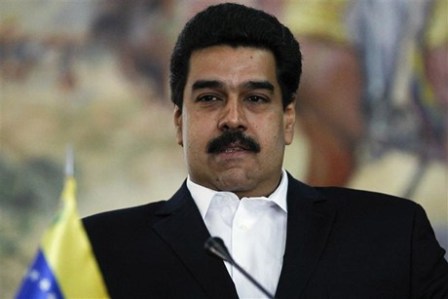CARACAS, (Reuters) – Venezuelan Vice President Nicolas Maduro said unidentified groups had entered the country with the aim of assassinating him and the head of the National Assembly as President Hugo Chavez recovers from cancer in Cuba.
Maduro provided no proof of the claim, made at a rally on Wednesday to mark the end of a dictatorship in the OPEC nation 55 years ago, but he said action would be taken shortly.

“For several weeks we’ve been following groups that have infiltrated the country with the aim of making attempts on the life of (Assembly head) Diosdado Cabello and my own,” Maduro told a crowd of red-shirted “Chavista” supporters.
“They will not manage it against either of us… Don’t be surprised by actions that are taken in coming hours and coming days. Criminals infiltrating our country can’t ask for mercy.”
Chavez named Maduro as his preferred successor before he went to Cuba in early December for surgery, his fourth operation in 18 months for an undisclosed form of cancer in his pelvis that was first diagnosed in mid-2011.
Chavez has not been seen nor heard from in public since then. Venezuela’s government says his condition is improving after he suffered multiple complications caused by the Dec. 11 surgery.
Officials say he is in “good spirits” but no date has been set for his return home. Maduro said he and the Energy Minister Rafael Ramirez would travel to Havana on Wednesday to see Chavez.
“NONSENSE”
Uncertainty over the 58-year-old president’s fragile health has raised the specter of political instability in the deeply polarized South American country of 29 million people.
In his 14 years in power, Chavez has repeatedly accused Venezuela’s “traitorous” opposition leaders of plotting to kill him, but has offered little proof.
The opposition says the charges are a smokescreen to distract from Venezuela’s daily problems such a shortages of staple goods, high inflation and one of the worst crime rates in the world.
“Now Maduro comes with the little story that we want to see an attempt against his life and that of Al Capone,” opposition leader Henrique Capriles said on Twitter, referring to Cabello as the Prohibition-era U.S. gangster. “Absolute nonsense!”
Both the opposition and the ruling Socialist Party had originally planned large marches for Wednesday Jan. 23.
It is an emotive date for Venezuelans that recalls the day in 1958 when military dictator Marcos Perez Jimenez fled the country amid widespread riots and a coup by rebel soldiers.
That had raised the possibility of supporters clashing in the streets, but the opposition subsequently decided to hold a meeting instead at a large hall in eastern Caracas.
Showing images of a fracas at that event, state TV said opposition supporters punched and hassled a crew, leaving one cameraman with a broken collar-bone. Authorities later said three suspects linked to the trouble had been arrested.
In the city center, three separate marches by Chavez supporters converged on the 23 de Enero neighborhood, which was named after the day Jimenez was toppled from power. The demonstrations were smaller than other rallies in recent months.
Wearing a red and white tracksuit and speaking from the stage, former bus driver Maduro said opposition supporters’ derogatory terms for him and Cabello – an ex-army buddy of Chavez – betrayed their disdain for Venezuela’s poor.
“They say ‘We must get rid of that little lieutenant and that bus driver,'” Maduro told the crowd, many of whom waved posters of Chavez or wore T-shirts with an image of his eyes.
“It is the condescending language of an oligarchy that will never understand who we are, who Chavez is, who the people are.”
